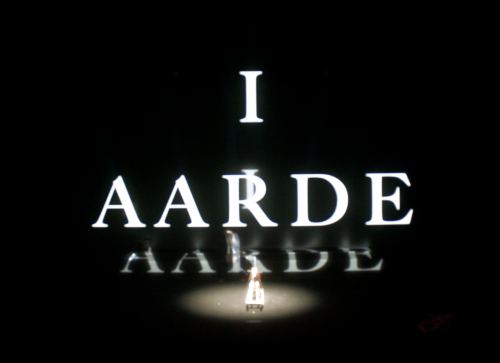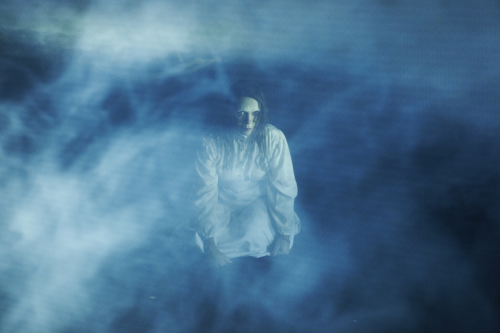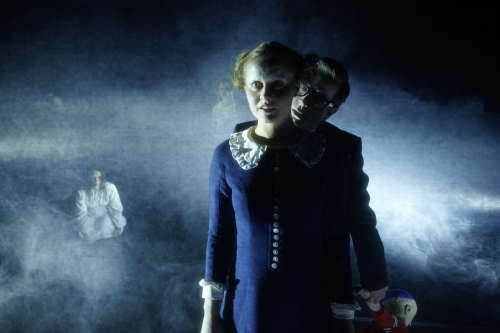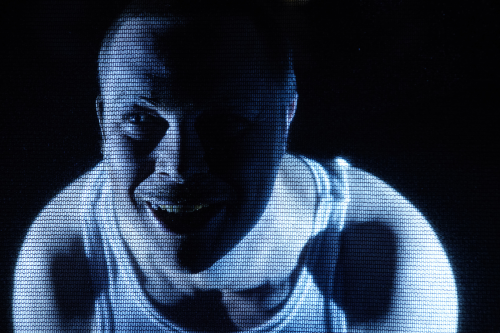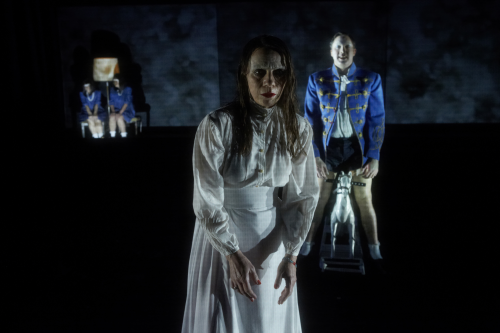User:Lena Mueller/Lena Mueller Little Eyolf 2012
Little Eyolf
Description
The following question inspired my graduation project: how can I create the experience of an outside space within a theatre? I aimed at the illusion of an open place, one that extends beyond any visible walls. My research’s main practical outcome is the set and video design for a theatre production of Henrik Ibsen’s Little Eyolf (1894), (premiere on 3 May 2012 at Het Nationale Toneel in The Hague). My research assesses how in live performance, digital video technology influences the perception of space. My starting point was to create a room that represents a state of mind; actors were to be vague figures in an apparently endless landscape of fog and air. With the help of projections, scrims, and artificial fog, I established the impression of a scene set outside, yet paradoxically also on location within a human mind rather than inside a theatre. My aim was to create a three dimensional space for images, combining layers of projection within an amorphous substance like fog. Rather than a conventional flat screen, I sought the illusion of depth and perspective on a nebulous body. The audience experience the tension between the scale of the human frame and the scale of the space around them. The collaboration intrinsic to theatre is essential to my working practice. Therefore my research entails analysing the results of the cooperation between different professions such as stage design, sound design, light design, directing, and acting. As this particular theatre production aimed at bringing natural and universal powers on stage, I was especially interested to see how all crafts combine together to create one entity. Like cinema, live performance takes place in an empty black space; my fascination with this fact forms the subject matter of my designs. Looking back on the other theatre designs I made during the Master Course at Piet Zwart Institute, I will show how my research into cinematic language influences my approach as a designer.
Media
Photos
Video
optional unless the final outcome of the project, or one of its main components, is a video/film/animation.
- allowed containers/codecs combos:
- WebM (preferred):
- Video codec: VP8 (3-5 Mbps data rate)
- Audio codec: Vorbis (-q 6)
- Ogg:
- Video codec: Theora (3-5 Mbps data rate)
- Audio codec: Vorbis (-q 6)
- MP4:
- Video Codec: H.264 (3-5 Mbps data rate)
- Audio Codec: AAC (160kbps or 384kbps if 5.1) or MP3 (-V0 or -b 320)
- WebM (preferred):
- resolution: 720p if source >= 720p, native resolution otherwise, progressive.
- FPS: 24, 25, 30.
- Sample rate:
- 44.1kHz if source is 44.1kHz or 88.2kHz
- 48 kHz if source is 48kHz or 96kHz
- 44.1 kHz for everything else.
Audio
optional unless the final outcome of the project, or one of its main components, is a sound piece/track.
- allowed containers/codecs combos:
- Ogg: Vorbis (-q 6) preferred
- MPEG: MP3 (-V0 or -b 320)
- FLAC (-8)
- Sample rate:
- 44.1kHz if source is 44.1kHz or 88.2kHz
- 48 kHz if source is 48kHz or 96kHz
- 44.1 kHz for everything else.
- Do not transcode! For instance, if the sound generated is directly an MP3, do not re-encode it with the settings above or with a different codec. Only encode original uncompressed or lossless compressed sources.
Essay
Abstract and bibs/ref + link to PDF (PDF must be uploaded to wiki).
Use Steve's recommendations for abstract length and bibliographic style.
Additional Information
non optional
- One page itemised budget estimate
optional
- Project URL (if lives on an external site)
- extra wiki links (in case you have relevant notes/journals/documentation in your User: page, this is useful particularly if you have been asked to articulate further or refine your project during your assessment)
- Animated GIFs

